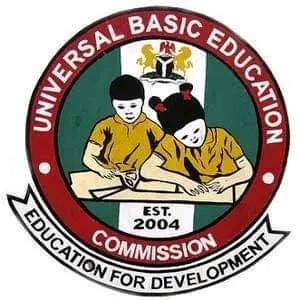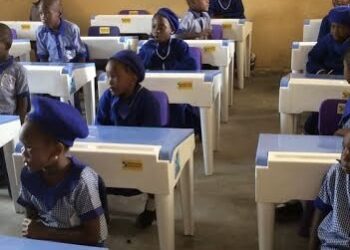By ABUBAKAR YUSUF
The Universal Basic Education Commission UBEC established by an act to regulate and coordinate the deployment of not only quality Education and provision of infrastructures, but ensured the activities of the States Universal Basic Education Boards SUBEB’s, through counterpart fundings and other numerous activities at the States and Local Government Levels achieved it’s desired results in all ramifications before and post COVID-19.
It is to the public knowledge that as part of it’s statutory functions to support State Governments with counterpart fundings for it’s basic Educational programs on yearly basis, it was no longer news that on many occasions, the Universal Basic Education Commission UBEC, had clamoured over non assessment of capital funds by state governments running into Billions.
The counterpart funds known as matching grants to state governments had remained unaccessed which had led to series of public statements and engagements by the management of UBEC, urging the state government not to allow the funds meant for their programs continue to lie idle.
As at the time of the last public awareness by UBEC management in May , 2023 , over 45B was lying idle in the States Universal Basic Education Board SUBEB’s account unaccessed, with a plea and the need to nil the account by the state governments.
It is also on record that out of the 36 states and the Federal Capital Territory FCT, only few states like Lagos among others had assessed to the fullest the already provided funds set aside by the Universal Basic Education Commission UBEC to States Universal Basic Education Board SUBEB’s.
The reasons behind non- assessment was obvious and glaring, as the previous order of releasing funds to state governments without the provision of counterpart funding by the state governments was prone to embezzlement, diversion, fraud and sharp practices on the part of the state governments.
This was also worsened by the non functioning of Local Government Administration virtually in all the states of the federation, because of the interference or usurp of the functions of the councils by state governments, under the guise of joint allocation between the States and local governments.
The adamance of most state governments to access the “free funds” provided by UBEC statutorily on a yearly basis has become a source of worry that was militating against the Educational development in the country, including erratic payment of salaries and allowances, lack of training and employment of teachers to Primary and Basic schools in the country.
The glaring anomaly and Educational backwardness created by the state governments through non -assessment of available funds, non- employment of teachers, lack of commensurate emoluments including training had not detered the Universal Basic Education Commission UBEC from executing it’s statutory functions across all strata.
UBEC had sustained the provision of qualified teachers to complement the state governments through the recruitment of teachers with the application of Federal Teachers Scheme (FTS) to complement the provision of manpower at the States Primary and Junior Secondary Schools in the country.
The commission had embarked on its series of statutory programs including the specialized ones, with training and retraining of teachers at the front burner.
It had disbursed a whopping 57B to ensure not only training, but also retraining of teachers for over a decade to enhance and encourage professionalism across the teaching strata.
Aside sustaining it’s statutory and other programs, both locally and internationally, the commission introduced many programs both specialized and for the general improvement of Basic Education too numerous to mention.
This was away from the debilitating effects of COVID-19, an emergency scourge that ravaged the entire world with Nigeria not in exception, through the introduction of “Smart Schools” across the six geo political zones, as well as assisting and coordinating the global digital program across states.
Determined to avoid reoccurrence of the experience of COVID-19 and post COVID-19, which heralded series of emergencies, job losses and lockdowns, the commission had invested billions into solidifying it’s investments on “Smart Schools” were school pupils and teachers can both function with both teaching and learning un-interrupted.
The commission in alliance with both local and international bodies took a bold step towards addressing Out of School Children OOSC, through enumeration, providing immediate, medium and long term solutions across the country.
In line with the commission’s mandate and determination, concerted efforts had been put in place to address the OOSC scourge through proactive decisions and articulation of needed requirements that will address permanently the problems of out of school children OOSC in Nigeria.
The commission over the years had not reneged on its statutory functions, and will rather advocate for more rejig of it’s activities, through provision of more funds, among many other requirements to expand the scope of Educational development in the country.
Efforts and new template must also be developed to support the states and local governments, through the constitutional review of the commission’s mandate to provide more supports to the elementary education at the state levelt, that will detach it from the domination of state governments.
This alone will bring about achieving universal education in Nigeria with the commission at the driver’s seat.
Written by ABUBAKAR YUSUF on yus.abubakar3@gmail.com.











